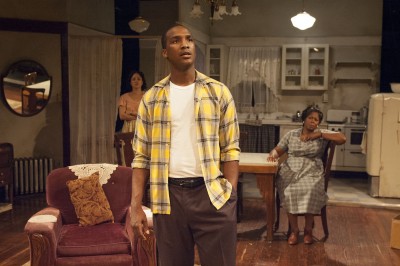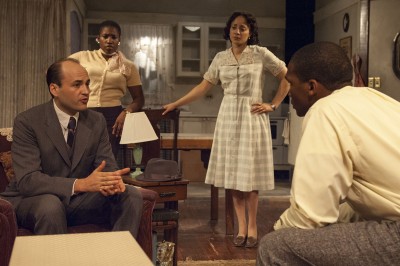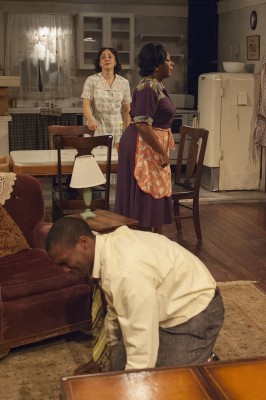A Raisin in the Sun
Directed by Ron OJ Parson
At Timeline Theatre, Chicago
Lorriane Hansberry’s 1959 classic drama still resonates today
Written about a Chicago family trapped in a two-bedroom apartment on the South Side of Chicago, A Raisin in the Sun is one of the finest plays of the 20th Century (it is Number 9 on my list). Based loosely on Hansberry’s own family experience integrating a white Chicago neighborhood, A Raisin in the Sun follows the events of the Younger family as they struggle to get their part of the American dream. This family believes that a better life is just around the corner.
We meet Walter Younger (the intense Jerod Haynes) who has big dreams that both motivate him and frustrate him as he strives for the pot of gold at the end of the rainbow. He wants fame and wealth; a better life for his family. He knows that there is more to life than being a chauffeur for a rich white man. Ruth (Toni Martin) is the wife who is content with her family’s status as she works diligently to keep everyone feed and clothed. Her son Travis (Alex Hendersen alternating with Oscar Vasquez III) the spirited hope for the future.
Add the college aged Beneatha Younger (Mildred Marie Langford), the wildly impressionistic youth who is searching for her identity as she plans to be a medical doctor. She dates a rich cultured man and an African student. She is an early feminist and the family rebel.
But the matriarch, who is the moral compass of the family, is Lena (Mama) Younger(Greta Oglesby). She rule the family from sheer will and moral conviction.
The play starts with the family anticipating the arrival of the insurance check for $10, 000 ($85,000 in today’s money) from the death of Lena’s husband. Walter expresses an entitlement to the cash for his entrepeunerial scheme to buy a liguor store with two street-wise partners. Mama is opposed to selling liquor since that led to her husband’s early death. Beneatha hopes Mama will use some of the money to finance her college education.
We see how the stress of living in a cramped ghetto apartment has on all the occupants. Mama’s strong desire to move after decades there gets her to purchase a home in Clybourn Park – a all-white Chicago neighborhood. She does so simply because home there are much cheaper than in black neighborhoods. Everyone except Walter are pleased. A new home is a major step toward reaching the good life.
When a white man from the Clybourn Park Association come to visit the Younger’s to offer to buy them out for a substantial profit, Walter, Ruth and Beneatha emotionally dismiss Karl Linder (Chris Rickett) from their home.
Mama, sensing that Walter needs to be responsible and take over the family leadership, give him the remaining $6, 500 from the insurance (she put down $3,500 on the house) telling him to put $3,000 in a saving account for Beneatha’s college while telling him to handle wisely the balance. But Walter, obsessed with his dream of owning a liquor store with his buddies, give Willy the $6,500 for the store. Walter will finally get his dream of ownership of a business.
However, Bobo (Wardell Julius Clark) arrives the next day to inform Walter that Willy has disappeared with both of their money. Gone is the entire $6.500 and all the Younger family dreams. mama and Ruth are determined to still make the move into their own home. Walter again has other ideas as he recontacts Lindner to negotiate the sale of the Clybourn Park home back to the association. in a powerful scene we see mama, Ruth and Beneatha confront Walter’s decision. Will Walter resell their home? See this fabulous show to find out.
A Raisin in the Sun is a testimony to the strength of family, the role of faith and courage as personal integrity triumphs as we see a man emerge with a moral compass to do right by himself and his family. The characters created by Hansberry are memorable and quite real.The passionate direction by Ron OJ Parson with the terrific dedicated performances by all the characters, particularly by Greta Oglesby (Mama) and Jerod Haynes as Walter speak to the humanity and spirit of the struggling African-American families in the1950’s. It is a classic work marvelously performed on Brian Sidney Bembridge’s realistic set in the intimate Timeline Theatre. I could smell the bacon cooking… and I could feel the Younger’s pain and their joy. This play is one of the best of 2013 – don’t miss it!
Highly Recommended
Tom Williams
At Timeline Theatre, 615 W. Wellington, Chicago, IL call 773-281-8463, www.timelinetheatre.com, tickets $35, $45, $48, students $10 off), Wednesdays & Thursdays at 7:30 pm, Fridays at 8 Pm, Saturdays at 3 & 8 pm, Sundays at 2 pm, running time is 2 hours, 30 minutes with intermission, through November 17, 2013




